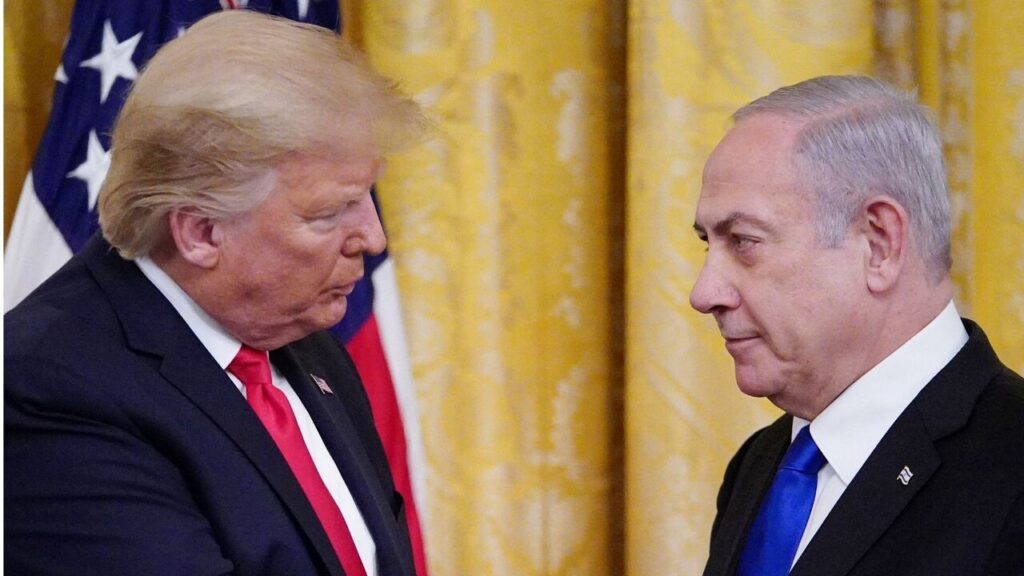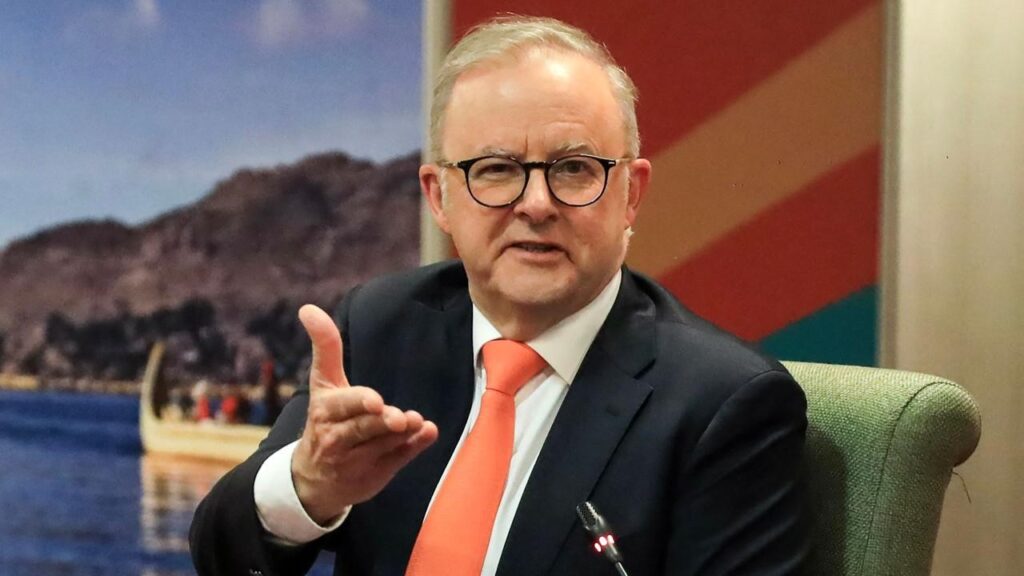Donald Trump and Benjamin Netanyahu give us a valuable lesson about power
JOHN CARROLL
12:00AMNovember 16, 2024

Donald Trump and Benjamin Netanyahu give us a valuable lesson about power.
The resounding Trump victory confirms the cardinal law which the conflict in the Middle East over the past year has brought into sharp focus: politics is about power. In times of peace and prosperity, such as we in Australia have enjoyed for almost 80 years, it is easy to forget, and continue along in the hopeful illusion that life is good, people are intrinsically nice, and problems can be solved amicably.
German sociologist Max Weber put it more tersely, in an enduringly influential lecture, Politics as a Vocation, delivered in Munich in January 1919, at the end of World War I: “The tasks of politics can only be solved by violence.” He was sharpening Machiavelli’s advice that no one should go into politics unless they care more about the state than their own soul – political virtue is a narrow groove, solely about serving the best interests of the state. Shakespeare had illustrated in his Henry VI trilogy, describing a king who is gentle and compassionate, but so weak at ruling that he loses all his French possessions and lets his kingdom degenerate into civil war, leaving almost everyone worse off. “The road to hell is paved with good intentions.
In peaceful times, the violence referred to by Weber is usually latent, implicit in the authority of the state, a potentiality to be activated, when necessary, to keep order, and to protect the nation. It is most apparent to individuals in everyday life when they feel under threat and need to call the police.

Netanyahu and Trump see “eye to eye” on the threat posed by Iran, the Israeli leader said in a video statement on Sunday.
- One of the appeals of Donald Trump to the United States electorate – I suspect his main appeal – has been that, in his bluster and braggadocio, he flexes power muscles and seems to show he is unafraid to mobilise power for his own ends. There is an intuitive understanding across middle and lower-middle America that progressive posturing and feel-good speeches will not steer the ship of state safely through turbulent waters. In contrast, secure borders, and resolved international conflict. When 70 per cent of Americans feel worse off than they were four years ago, they want strength in leadership and focus on their everyday interests.
The Trump persona – aggressive, confrontational, and petulant, not to mention pathologically narcissistic – also seems to have appealed to marginalised social strata. Those living in poorer states, young black and Latino males, recent immigrants, and the old city working classes resenting their decline, all seem to have been drawn to his maverick contempt for the trendy issues of the time. His character may be suspect – indeed he is widely disliked – but he appears powerful, practical, and not of the coterie elite. In politics, power eclipses niceness.
Trump tariffs ‘very bad’ Our own Prime Minister might take note, given his incapacity for making tough decisions, his dithering reflex of looking away in difficult moments. Any candidate for political office, once chosen for leadership, must have the will to take the wheel of a very powerful car, tasked from time to time to make a fast journey down a narrow, precipitous mountain road – and be highly skilled at driving. Otherwise, he is disqualified from the company of competent leaders.

for global trading systemAnthony Albanese might take note, given his incapacity for making tough decisions. Picture: Handout/ANDINA/AFP
Turning away from the American election, the Weber/Machiavelli axiom about power and violence finds starker, more compelling illustration in the Middle East. Israel’s challenges in Gaza and Lebanon should serve as a wake-up call amidst the silliness of much of what passes for government in Western countries today.
The utopian political attitude of let’s be nice, assume the best about people, and hope for social harmony, has been displayed in the Biden administration’s preoccupation with diplomacy. The United States has been tireless in pursuing a diplomatic solution to the Gaza war, with Secretary of State Anthony Blinken seemingly in perpetual motion flying from one Middle Eastern capital to another, then back, not to mention thousands of telephone calls. And the result: complete failure.
The atrocity of October 7, 2023, set the die: whatever followed would not be settled by diplomacy. Israel’s modus operandi is realpolitik. Driven by necessity, it is in an elemental struggle for survival, with little choice in its courses of action. Once it had worked its way free from the impediments of intelligence and military failure on October 7, and weathered diplomatic pressure from Washington, on whom it is dependent, it took the initiative over recent months. With a series of dazzling mobilisations of violence, from targeted assassination to exploding Hezbollah pagers, to bombings in Lebanon, it has proved its superiority as a fighting machine, driving Iran and its proxies into a humiliating, rattled, and confused retreat. Now, Trump and his victory is added to that, cheered on in Jerusalem given his earlier advice to the Israeli Prime Minister: “Just do what you have to do.”
Frank Knopfelmacher, arguably Australia’s one great political philosopher, was a devotee of realpolitik. He commented tartly after Israel’s success in the six-day-war of 1967 that the Jews would now lose their status as darlings of the left, for they were no longer to be looked down upon with patronising generosity, pitied as victims. They had committed the most unpardonable crime: they had won.
The war in the Middle East and in a lesser key, the American election are salutary reminders to we who live at a safe distance, that politics is not a fairy tale but a dour and grim business.
Many of those left-inclined Jewish intellectuals who came after, here and elsewhere, might be twitching when reminded of the Knopfelmacher warning, ruing not having taken more heed of it. Maybe his insight into the inner disposition and deeper motives of much of the modern left, its innate, perhaps even instinctive hatred of its own nation, might have been just too discomforting – resenting its culture and its civilisation. The consequences of hard-left politics have come back to bite. 1960s student radicalism finally reached its full flowering, its logical end point, half a century later, in the rampaging anti-Semitism of current Free Palestine demonstrations.
Today, there is a new turn in the road. From the Jews as victims of the Holocaust, Israel had developed as a lonely beacon in the Arab world, advertising the superiority of Western economic, social, and political organisation, bringing prosperity, technological innovation, and thriving communities, enhanced by that special Jewish ingenuity and intelligence. All set within a secular democratic polity, surrounded by stagnant and impoverished feudal despotisms. Now, Israel is serving as a different kind of beacon, this time shining its light back in the other direction, over the West. Its brutal lesson about power politics shows Western countries up for what they have lost. They are in danger of having exhausted the hard-headed willingness to defend their own interests, forgotten what it means to fight. The Jews have gone, in a strange historical twist, from marginalised pariahs to heroic exemplars. They have become, through their Israel manifestation, the leaders of Western civilisation, its one defender in this unhappy hour, and thereby its champions.
We live in an Alice in Wonderland time in the West, of the public stage showing off the performed antics of Tweedledee nonsense speech, as Greens fulminate and fringe sexual orientations are celebrated, all without Tweedledum’s wit. Public demonstrations mimic the Mad Hatter’s tea party, with thousands shouting in staccato: “Off with their heads!” A society, with its own head in cloud-cuckoo-land, muddles along ruled by the petulant, unstable, and erratic Queen of Hearts, ignorant of the rules of croquet, or the proper equipment. A white rabbit rushes past panicked because it’s late, while having no idea of where it’s goingSpaceX Caught a Rocket With ‘Chopsticks.’ What Will I
The posturing of the Australian government on Israel has been pretend politics. From the Prime Minister to the Foreign Minister addressing the United Nations – itself a gallery of grievance-stoked, irrelevant opinion – the policy is blind to reality. It has no chance of being taken seriously by the conflicting powers that matter, whether a proposed ceasefire, a proposed two-state solution, or a proposed independent Palestinian state. Here is dreamland politics hitting its head against the stone wall of a conflict which will only end with the successful mobilisation of force by one side to crush the other. Politics of the Albanese/Wong variety is left dazed, with the warring parties unmoved.
The Cheshire Cat grins down, as if knowing what is to come, making the actors uneasy, for now she’s there, now she’s gone. She simulates the ministering angel of destiny, but with the comic twist of appearing from time to time, at whim, to laugh at the poor fools trapped in her designs. Lewis Carroll conjured up a brilliant range of characters – in fact, identities. In his story, colourful identity is everything, as life proceeds chaotically onwards, lacking a narrative, reduced to a series of arbitrary episodes without direction.
What could be more instructive for a time like ours, concerned about the tribulations of identity, a domain in which it is woefully insecure, its individual actors permanently on edge, fearful of what awaits them around the next corner, scared they are being mocked, or are about to be mocked, displacing their anxiety about themselves into hatred of others they imagine to be persecuting them. Tweedledum and Tweedledee were highly mockable, indeed they appeared utterly ridiculous, acting with oafish absurdity, but they themselves remained completely unfazed by who they were and how they looked. A bit like Donald Trump
Within identity politics, living is reduced to its lowest common denominator – of power plays. Power is everything, with ambivalent swings between fear of impotence, of being a non-person, a nullity, and explosions of rage, a tantrum stamping need to do something, to be someone of moment, as if ranting against the enemy will change the world.
The intimate and personal is politicised, as with sexual dispositions, usually killing off its pleasures; while the truly political, the affairs of state, are made personal. A true Wonderland inversion! Further, the occupants of this space, preoccupied by who they are, and how they are seen, are at risk of losing track of their practical interests. And they have little idea of where they’re going.
‘trIn the end Alice woke up. The war in the Middle East and, in a lesser key, the American election are salutary reminders to we who live at a safe distance, that politics is not a fairytale but a dour and grim business, of relentless and grinding hard work, often unglamorous and tedious, at times nerve-rackingly fraught, all to serve the wellbeing of its subjects.
At its core, it is the judicious use of power for the public good.
John Carroll is Professor Emeritus of Sociology at La Trobe Universityuly’
